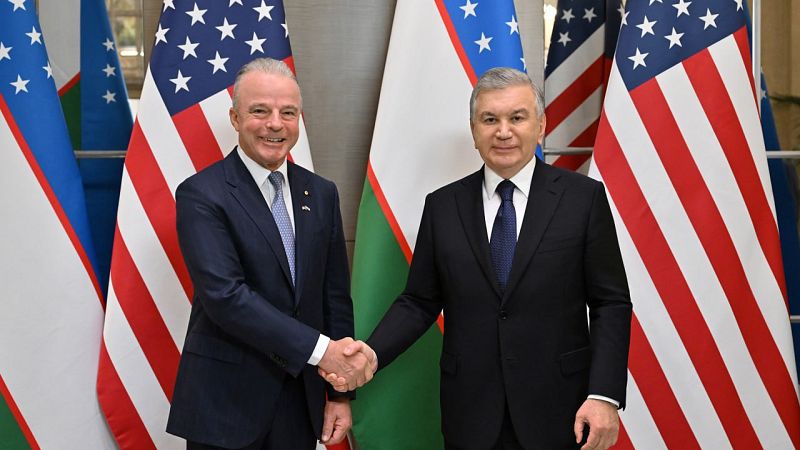
Uzbekistan and the United States Forge Stronger Economic Ties with Landmark Aviation Deal
Uzbekistan's President Shavkat Mirziyoyev's recent visit to New York City, coinciding with the UN General Assembly, has yielded significant advancements in economic cooperation between Uzbekistan and the United States. A centerpiece of this strengthened relationship is a monumental aviation agreement with Boeing, signaling Uzbekistan's commitment to modernizing its aviation sector and expanding its global connectivity.
A Multi-Billion Dollar Boeing Deal
The agreement with Boeing, valued at over $8 billion, involves Uzbekistan Airways acquiring 14 Boeing 787-9 Dreamliners, with options for an additional eight aircraft. Deliveries are slated to begin in 2031. This purchase is a substantial investment in modernizing Uzbekistan's aviation infrastructure and is expected to significantly boost the airline's capacity on key international routes.
Uzbekistan Airways has been operating Boeing 787 aircraft since 2016, and this new contract further solidifies the airline’s commitment to utilizing advanced technology to enhance its services. The Dreamliner's fuel efficiency and operational flexibility are expected to enable Uzbekistan Airways to expand into new markets, connecting more travelers to the country's rich culture and fostering greater international engagement.
High-Level Roundtable and Investment Agreements
Beyond the Boeing deal, President Mirziyoyev hosted a high-level roundtable in New York City, bringing together leaders from prominent American companies, investment funds, and financial institutions. The event underscored the growing interest and confidence in Uzbekistan's economic potential.
The roundtable featured notable figures, including Sergio Gor, Special Envoy of the US President for South and Central Asian Affairs, and representatives from leading firms such as Franklin Templeton, Citigroup, BNY Mellon, NASDAQ, Mastercard, Visa, General Motors, Nvidia, Oppenheimer, Jefferies, Air Products, and Cargill. Heads of major Uzbek companies also participated, facilitating direct dialogue and exploration of collaborative opportunities.
Following the roundtable, a ceremony was held to sign bilateral agreements, further cementing Uzbekistan's position as a reliable partner for US enterprises. These agreements span various sectors, reflecting the breadth and depth of the growing economic partnership between the two countries.
The signed agreements encompass the following:
- Transport Cooperation: An agreement on long-term cooperation in the field of transport between the Ministry of Transport of Uzbekistan and Boeing.
- Mining Equipment Production: An agreement on the establishment of a joint venture for the production of mining and processing equipment between Technopark LLC and FLSmidth company.
- Healthcare and Education: An agreement on the creation of a multidisciplinary clinic and an educational institution between Akfa Group and Cleveland Clinic.
- Aviation Partnership: An agreement on mutual partnership and cooperation between the Centrum Air airline and the investment company Oppenheimer.
- Financial Cooperation: An agreement on cooperation between the Ministry of Economy and Finance of Uzbekistan and Citigroup.
- Financial Services: An agreement on financial cooperation between Uzbekhydroenergo JSC and Cargill Financial Services International.
- Gas Technology: An agreement on cooperation between Uztransgaz JSC and Pangea Filtration Technology.
- Geological Exploration: An agreement on conducting geological exploration at prospective sites between the Ministry of Mining Industry and Geology of Uzbekistan and Cove Capital.
- Mining Cooperation: An agreement on cooperation between Yangi Kon LLC and SLB company.
- Artificial Intelligence and Biotechnology: An agreement on cooperation in establishing funds to finance projects in the fields of artificial intelligence and biotechnology between the Fund for Reconstruction and Development of Uzbekistan and Biologic International company.
Expanding US-Uzbekistan Economic Cooperation
President Mirziyoyev highlighted the significant progress in US-Uzbekistan economic relations, noting that trade between the two countries has quadrupled in the past eight years. Over 300 American companies are now investing in Uzbekistan, demonstrating the growing attractiveness of the country as an investment destination. The establishment of a National Investment Fund in collaboration with Franklin Templeton further underscores the commitment to long-term economic partnership.
Key areas for future cooperation were identified, including critical mineral processing, sustainable supply chains, IT, artificial intelligence, digitalization, transport, energy, infrastructure development, and smart agriculture. These sectors represent significant opportunities for joint ventures and investments that can drive economic growth and create jobs in both countries.
American business leaders praised Uzbekistan for creating a favorable investment climate and expressed their commitment to actively participating in upcoming projects across various sectors. This positive feedback reflects the ongoing reforms and efforts to improve the business environment in Uzbekistan.
Strategic Implications
The strengthened economic ties between Uzbekistan and the United States have broader strategic implications for the Central Asian region. Uzbekistan's efforts to modernize its aviation sector and expand its transport network are contributing to its emergence as a key transit hub, connecting Central Asia with major markets around the world. This enhanced connectivity is expected to foster tourism, investment, and global partnerships, driving economic development and regional integration.
The Boeing deal, in particular, is seen as a symbol of successful economic diplomacy, demonstrating how partnerships can translate into jobs and opportunities on both sides. The agreement is expected to create over 35,000 jobs in the United States, highlighting the mutual benefits of the growing economic relationship between Uzbekistan and the United States.


No comments:
Post a Comment